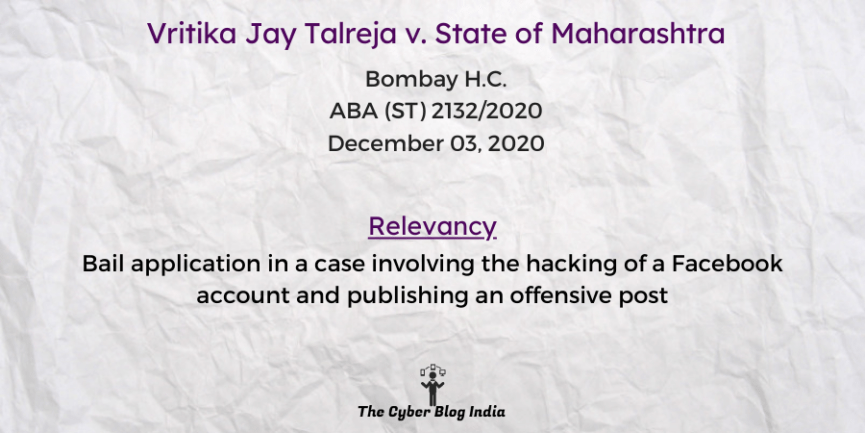Vritika Jay Talreja v. State of Maharashtra

Vritika Jay Talreja v. State of Maharashtra & Anr.
In the High Court of Bombay
ABA (ST) 2132/2020
Before Justice Sarang V. Kotwal
Decided on December 03, 2020
Relevancy of the case: Bail application in a case involving the hacking of a Facebook account and publishing an offensive post
Statutes and Provisions Involved
- The Information Technology Act, 2000 (Section 43A, 66C)
- The Indian Penal Code, 1860 (Section 379, 501)
Relevant Facts of the Case
- The informant/intervenor lodged a complaint that someone had hacked his Facebook account.
- In January 2019, the informant sold a luxury car to an actress and her husband, clicked a picture with the latter, and kept the same photograph as WhatsApp status.
- On May 2, 2019, the informant’s wife brought to his attention that an offensive and obscene sentence had been posted with the same photograph on his Facebook account.
- The informant realised that his Facebook account was hacked as he could not access his account with the user ID and password.
- Hence, the informant filed an FIR against the applicant under Sections 379 and 501 of the Indian Penal Code, 1860 and Sections 43A and 66C of the Information Technology Act, 2000.
- The applicant filed an anticipatory bail application in connection with the case registered against her.
Prominent Arguments by the Advocates
-
- The applicant’s counsel contends that the informant falsely implicated the applicant due to prior enmity. He further argued that she lacks the expertise for computer hacking. The investigating officer’s report states that the applicant’s mobile number, shared for office purposes, was hacked from her handset. However, the police could not identify the perpetrator. Additionally, he emphasised that the FIR does not specify any non-bailable offence.
- The informant’s counsel submitted that the applicant has a history of offences and is quite familiar with operating a Facebook account. Hence, the course should not grant bail to her, based on this knowledge.
Opinion of the Bench
- All the employees utilised the mobile number and handset used in hacking. Therefore, it is challenging to attribute sole responsibility to the applicant. Additionally, the investigation did not unveil any special knowledge possessed by the applicant for hacking.
- The informant filed the FIR several months after the incident, indicating an afterthought.
- The lack of conclusive evidence against the applicant would cause irreparable harm in the event of custodial interrogation.
Final Decision
- The bench granted the bail application.
